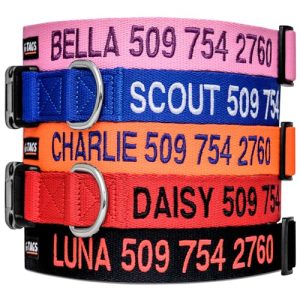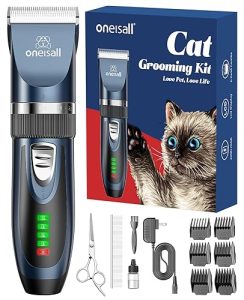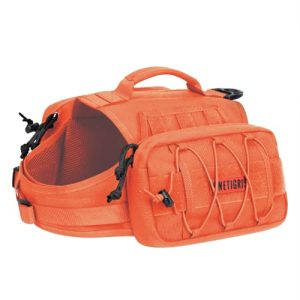If you want your dog to look and feel their best during grooming, there’s an important step you can’t skip: making sure they have the right shots. You might wonder why vaccinations matter for a simple grooming session.
The truth is, these shots protect your furry friend from serious diseases and keep everyone safe at the salon. Wondering which vaccines your dog needs before their next grooming appointment? Keep reading to discover exactly what shots are required and why they’re so important for your dog’s health and happiness.
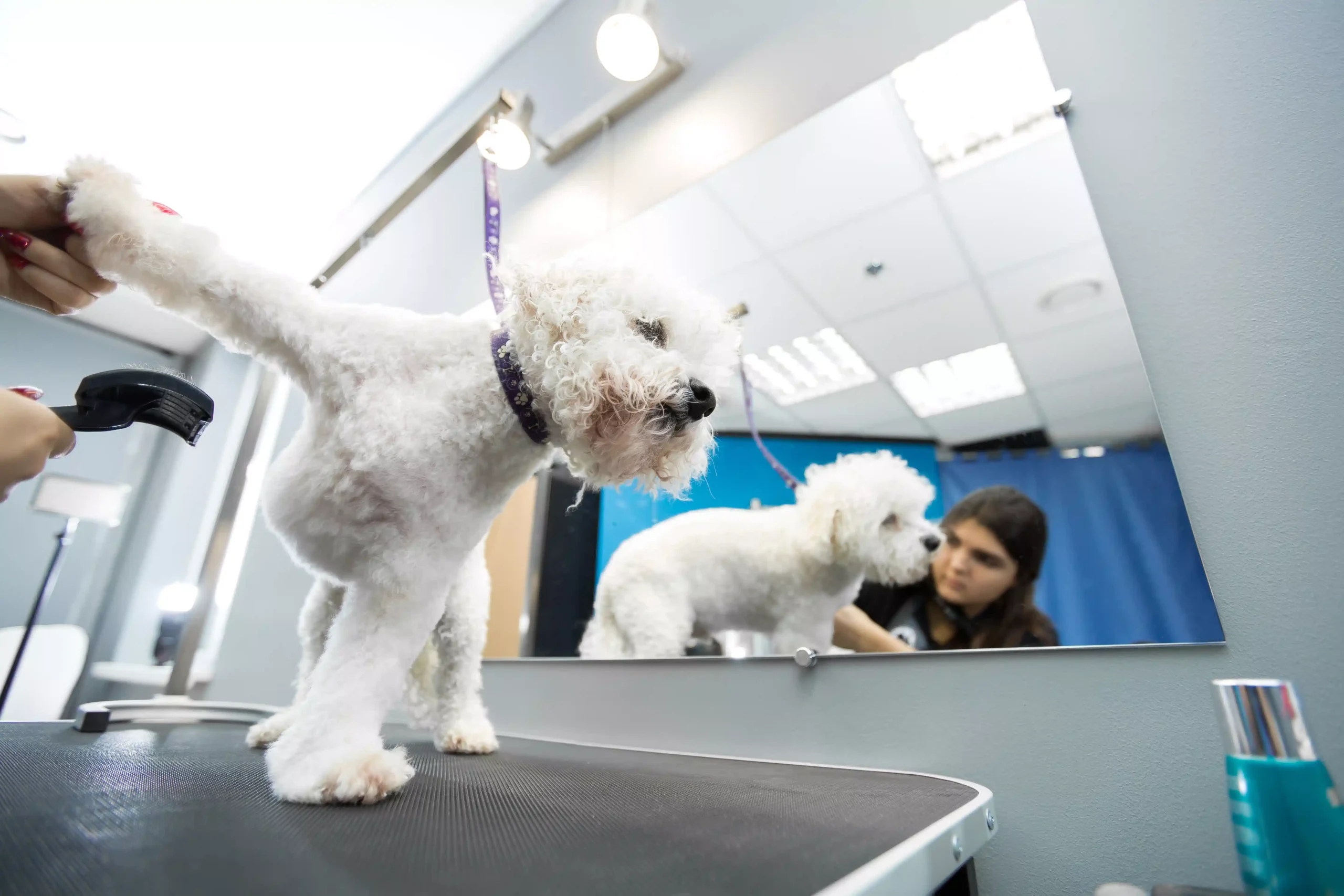
Credit: happypupmanor.com
Core Vaccines For Dogs
Vaccines protect dogs from common, serious diseases. Groomers often ask about shots needed before grooming.
Core vaccines are essential for every dog. They keep your dog healthy and safe during grooming visits.
Rabies Vaccine
Rabies is a deadly virus that spreads through bites. The vaccine protects dogs and people from this disease.
Most places require rabies shots by law. Dogs usually get their first rabies vaccine at 12 to 16 weeks old.
Distemper Vaccine
Distemper is a serious virus that harms the respiratory and nervous systems. The vaccine stops this infection.
- Distemper affects dogs of all ages.
- The vaccine starts at 6 to 8 weeks old.
- Boosters are given every 3 to 4 weeks until 16 weeks.
- Annual boosters keep dogs protected.
Parvovirus Vaccine
Parvovirus causes severe gut illness and can be fatal. Vaccination is the best defense.
| Age to Start | Booster Shots | Protection Level |
| 6 to 8 weeks | Every 3-4 weeks until 16 weeks | High |
| Annual boosters | Every year after first year | Maintains immunity |

Credit: www.petsuitesofamerica.com
Non-core Vaccines To Consider
Some vaccines are optional but important for dogs that go to grooming sessions. These vaccines protect against diseases that spread easily in close contact.
Groomers often require these shots to keep all pets safe. Knowing about these vaccines helps owners decide what their dog needs.
Bordetella Vaccine
The Bordetella vaccine helps protect dogs from kennel cough. This is a very contagious cough spread in places like groomers or kennels.
- The vaccine can be given as a shot or nasal spray.
- It reduces coughing and other symptoms.
- Dogs that visit groomers should get it yearly.
Leptospirosis Vaccine
Leptospirosis is a disease spread by wild animals and water. This vaccine protects dogs from serious kidney and liver problems.
| Risk Factor | Why Vaccinate |
| Outdoor Dogs | Exposed to wildlife and water sources |
| Dogs in Urban Areas | Possible contact with rodents |
| Dogs Visiting Groomers | Close contact with other dogs |
Canine Influenza Vaccine
Canine influenza spreads fast in places with many dogs. Grooming centers can be a risk for this flu.
- Vaccine lowers flu symptoms and spread.
- Recommended for dogs in group settings.
- Given yearly to keep protection strong.
Vaccines Often Required By Groomers
Groomers want to keep all dogs safe and healthy. They often require certain vaccines before grooming sessions.
Vaccines help stop the spread of diseases among dogs in close contact.
Bordetella For Kennel Cough
Bordetella vaccine protects dogs from kennel cough. This illness spreads easily in places like grooming salons.
Many groomers ask for proof of this vaccine to prevent outbreaks.
- Given by nasal spray or injection
- Protects against a common respiratory infection
- Usually required every 6 to 12 months
Rabies Proof
Rabies vaccine is critical for dog health and public safety. It is often required before grooming.
Rabies can spread to humans and animals, so proof of vaccination is important.
- Legally required in most places
- Usually given once every 1 to 3 years
- Proof must be current and valid
Annual Booster Shots
Annual booster shots keep a dog’s immunity strong. Groomers often require these up-to-date shots.
Boosters protect against diseases like distemper, parvovirus, and adenovirus.
- Given every year or as advised by a vet
- Helps maintain long-term health
- Required to reduce risk of illness in group settings
Vaccination Schedule For Grooming
Keeping your dog healthy is important before any grooming session. Vaccinations protect your dog and others at the grooming salon. Knowing the right shots and timing helps avoid health risks.
This guide covers the vaccination timeline for puppies, booster shots for adult dogs, and when to get vaccinated before grooming appointments.
Puppy Vaccination Timeline
Puppies need a series of vaccines starting from six weeks old. These shots build immunity against common diseases before grooming.
- 6 to 8 weeks: First dose of DHPP (distemper, hepatitis, parvovirus, parainfluenza)
- 10 to 12 weeks: Second DHPP dose plus Bordetella vaccine
- 14 to 16 weeks: Third DHPP dose and rabies vaccination
- 16 to 18 weeks: Optional vaccines like Lyme disease or leptospirosis based on vet advice
Adult Dog Booster Timing
Adult dogs need booster shots to keep their immunity strong. These vaccines reduce the risk of infection during grooming visits.
| Vaccine | Booster Frequency |
| DHPP | Every 1 to 3 years |
| Rabies | Every 1 to 3 years depending on local laws |
| Bordetella | Every 6 to 12 months |
| Leptospirosis | Annually if recommended |
Timing Before Grooming Appointments
Vaccines should be given enough time before grooming. This ensures your dog is protected and avoids vaccine side effects during the visit.
- Schedule vaccinations at least two weeks before grooming.
- Avoid grooming right after vaccination to watch for reactions.
- Keep vaccination records handy for the groomer.
Health Benefits Of Vaccinations
Vaccinations keep dogs healthy by stopping serious illnesses. They protect dogs from diseases that spread easily.
Getting the right shots helps dogs live longer and enjoy visits to the groomer safely.
Preventing Infectious Diseases
Vaccines stop many dangerous diseases. They protect dogs from infections that can make them very sick.
- Rabies
- Parvovirus
- Distemper
- Canine hepatitis
- Leptospirosis
Protecting Other Pets
Vaccinated dogs lower the risk of passing diseases to other pets. This keeps all animals in the home safe.
| Vaccine | Protects Against | Risk to Other Pets |
| Rabies | Rabies virus | High |
| Parvovirus | Parvovirus infection | High |
| Leptospirosis | Bacterial infection | Moderate |
Ensuring Safe Grooming Visits
Groomers require certain vaccinations before working with dogs. This protects both dogs and staff from illness.
Common vaccines needed for grooming include:
- Rabies
- Distemper
- Parvovirus
- Bordetella (Kennel Cough)
What To Tell Your Groomer
When you take your dog to a groomer, it is important to share key information. This helps ensure your pet gets the best care possible.
Groomers need to know about your dog’s health and vaccine records. Clear communication helps them provide safe grooming services.
Providing Vaccine Records
Groomers often require proof of vaccinations. This keeps all pets safe in the grooming salon.
Share your dog’s vaccine records before your appointment. Common vaccines include rabies and bordetella.
Communicating Health Concerns
Inform your groomer about any health issues your dog has. This includes allergies, skin conditions, or recent surgeries.
Knowing these details helps the groomer handle your dog with care. It also prevents any potential health risks.
Following Groomer Requirements
Each groomer may have specific rules for their clients. These might include bringing your own dog shampoo or confirming appointments.
Check with your groomer about any special instructions. This ensures a smooth and stress-free grooming session.
When Vaccinations Are Not Enough
Vaccinations are crucial for your dog’s health. They help protect against diseases. Yet, sometimes they aren’t all your pet needs for grooming visits.
Grooming requires more than just vaccinations. Other factors may affect when your dog can be groomed. Understanding these can ensure your pet’s safety.
Signs To Postpone Grooming
Some signs mean you should delay grooming. It is important to be aware of these signs to keep your dog safe.
Look for signs of illness or discomfort. These could mean your dog should not visit the groomer yet.
- Frequent coughing or sneezing
- Visible injuries or skin issues
- Unusual tiredness or lack of energy
Alternative Grooming Options
Sometimes, your dog might not be ready for a professional groomer. There are other ways to keep them clean at home.
Home grooming can be a safe option. It allows you to care for your pet when they are not well enough for a grooming salon.
- Brush your dog’s coat regularly
- Use pet-friendly wipes for quick cleaning
- Trim nails with special clippers
Consulting Your Veterinarian
Your veterinarian is a valuable resource. They can advise when it’s safe for your dog to be groomed.
Discuss your dog’s health with them. They can offer guidance and suggest the best grooming plan.
- Ask about vaccinations and additional health checks
- Seek advice on home grooming techniques
- Inquire about signs of potential health issues
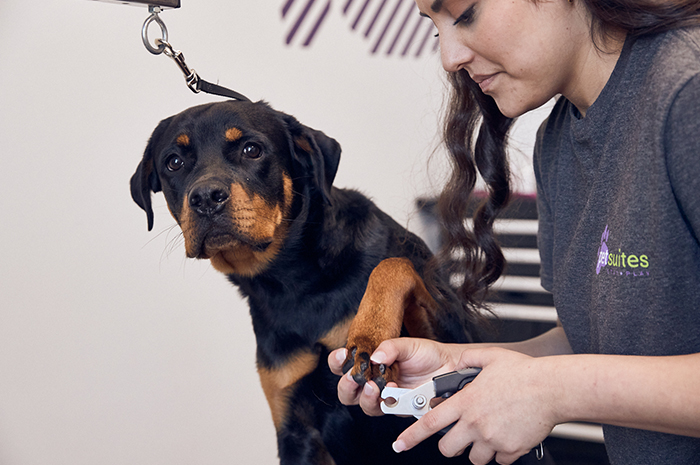
Credit: www.petsuitesofamerica.com
Frequently Asked Questions
What Vaccinations Are Required Before Dog Grooming?
Most groomers require rabies, distemper, and parvovirus vaccines. These protect your dog and others from contagious diseases. Always confirm with your groomer about specific vaccination needs.
Why Is The Rabies Shot Important For Grooming?
Rabies vaccination is legally mandatory in many areas. It prevents a fatal viral disease and ensures safe interaction with other pets during grooming.
How Often Should Dogs Get Grooming Shots?
Vaccinations should be updated annually or as advised by your vet. Regular boosters keep your dog protected and eligible for grooming services.
Can Unvaccinated Dogs Still Get Groomed?
Most professional groomers refuse unvaccinated dogs to prevent disease spread. It’s best to keep vaccinations current to avoid grooming restrictions.
Conclusion
Getting the right shots helps keep dogs healthy and safe. Groomers often ask for proof of vaccinations before grooming. Common shots include rabies, distemper, and parvovirus vaccines. These protect your dog from serious illnesses. Keeping vaccines up to date also protects other pets.
Always check with your vet about needed vaccines. A healthy dog enjoys grooming more and stays happy. Vaccines and grooming together support your dog’s well-being. Simple steps like these make a big difference. Care for your dog with regular shots and grooming.

Emily Barker is the founder of ChillDogLife.com, a space dedicated to helping pup parents discover the best dog products, lifestyle tips, and cozy ideas for happier homes.
A lifelong dog lover, Emily combines her passion for pets with a knack for research to share trusted recommendations on everything from toys and furniture to health and everyday care.
Her goal is simple: to make life easier, stylish, and more joyful for dogs and the people who love them.





